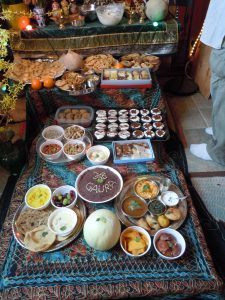Submitted by: Yasoda nandana Dasa
Saturday,July 9, 2016 [Los Angeles, California time zone]
Sunday, July 10, 2016 [Mayapura, West Bengal time zone ]
Sunday, July 10, 2016 [Mayapura, West Bengal time zone ]
Srila Prabhupada explains the meaning of the festival of Hera Pancami
guṇḍicāte nṛtya-ante kaila jala-keli
herā-pañcamīte dekhila lakṣmī-devīra kelī
SYNONYMS
TRANSLATION
After dancing in the Guṇḍicā temple, the Lord sported in the water with His devotees, and on Herā–pañcamī day they all saw the activities of the goddess of fortune, Lakṣmīdevī.
Sri Caitanya-caritamrta – The Later Pastimes of Lord Sri Caitanya Mahaprabhu : Madhya 1.145
Sri Caitanya-caritamrta – The Later Pastimes of Lord Sri Caitanya Mahaprabhu : Madhya 1.145
kalya ‘herā-pañcamī‘ habe lakṣmīra vijaya
aiche utsava kara yena kabhu nāhi haya
SYNONYMS
TRANSLATION
PURPORT
This Herā–pañcamī festival takes place five days after the Ratha–yātrā festival. Lord Jagannātha has left His wife, the goddess of fortune, and gone to Vṛndāvana, which is the Guṇḍicā temple. Due to separation from the Lord, the goddess of fortune decides to come to see the Lord at Guṇḍicā. The coming of the goddess of fortune to Guṇḍicā is celebrated by Herā–pañcamī. Sometimes this is misspelled as Harā–pañcamī the section known as ativāḍī. The word herā means “to see” and refers to the goddess of fortune going to see Lord Jagannātha. The word pañcamī means “the fifth day” and is used because this takes place on the fifth day of the moon.
Sri Caitanya-caritamrta – 1975 Edition : Cc. Madhya-lila : Madhya 14: Performance of the Vrndavana Pastimes : Madhya 14.107 :
nīlācale āilā punaḥ bhakta-gaṇa-saṅge
dekhite utkaṇṭhā herā-pañcamīra raṅge
SYNONYMS
TRANSLATION
Śrī Caitanya Mahāprabhu and His personal devotees returned to Nīlācala with great eagerness to see the Herā–pañcamī festival.
Sri Caitanya-caritamrta – 1975 Edition : Cc. Madhya-lila : Madhya 14: Performance of the Vrndavana Pastimes : Madhya 14.114
pūrvavat ratha-yātrā kaila daraśana
herā-pañcamī-yātrā dekhe lañā bhakta-gaṇa
SYNONYMS
TRANSLATION
As in the previous year, the Lord, with all the devotees, saw the Ratha–yātrā festival and the Herā–pañcamī festival as well.
Sri Caitanya-caritamrta – 1975 Edition : Cc. Madhya-lila : Madhya 16: The Lord’s Attempt to Go to Vrndavana : Madhya 16.54
The glories of Hera Pancami, also known as or Laksmi-vijaya, are described by Srila Prabhupada in his Bhaktivedanta Purports to Caitanya-caritamrta 14.107 and 133:
“The Hera-pancami festival takes place five days after the Ratha-yatra festival. Lord Jagannatha has left His wife, the goddess of fortune, and gone to Vrndavana, which is the Gundica temple. Due to separation from the Lord, the goddess of fortune decides to come to see the Lord at Gundica. The coming of the goddess of fortune to Gundica is celebrated as Hera-pancami. Sometimes this is misspelled as Hara-pancami among the ativadis. The word hera means “to see” and refers to the goddess of fortune going to see Lord Jagannatha. The word pancami means “the fifth day” and is used because this takes place on the fifth day of the moon.” (Madhya 14.107)
“When Lord Jagannatha starts His car festival, He gives assurance to the goddess of fortune that He will return the next day. When He does not return, the goddess of fortune, after waiting two or three days, begins to feel that her husband has neglected her. She naturally becomes quite angry. Gorgeously decorating herself and her associates, she comes out of the temple and stands before the main gate. All the principal servants of Lord Jagannatha are then arrested by her maidservants, brought before her and forced to fall down at her lotus feet.” (Madhya 14.133)



